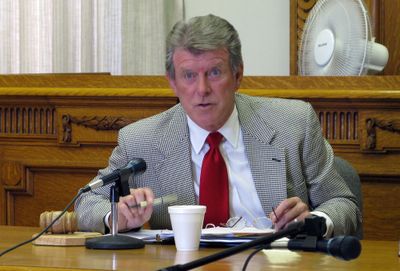Otter defends public land transactions

BOISE - Idaho Gov. Butch Otter spoke out Tuesday against limiting public information about state land transfers, saying he wants “total and complete transparency.”
The governor’s comments came after a committee of top real estate professionals, asked to review how Idaho could update its rules for transfers of state endowment lands to match “modern business practices,” recommended eliminating the requirement for public auctions and exempting the transactions from the state’s Public Records Act.
Otter immediately objected to the proposed changes, some of which would require amendments to the state constitution and the Admissions Act, by which Idaho became a state.
“We have to make sure that there is total and complete transparency,” Otter declared. “Taking it off public auction inherently reduces the transparency. … I would have a problem with that.”
Otter said he’d also oppose exempting state land transactions from the Public Records Act. The state Land Board commissioned the report “to look at one narrow issue,” said Idaho Attorney General Lawrence Wasden. “There are a lot of other factors we have to take into account … such as can we create a system that will preserve transparency.”
The Land Board is made up of the state’s top elected officials and is charged by the state constitution with getting the maximum financial return from state endowment lands. Those lands are held in trust to earn money for public schools, universities and other state institutions.
Board members didn’t raise objections to other proposals from the panel, to amend the constitution to eliminate acreage limits on transfers of state land to a single individual or company.
The panel also proposed allowing sales of state endowment lands “in any reasonable manner” rather than only by public auction. “Our intent was to provide flexibility to the state, then let the state decide through its laws how best to govern these transactions,” said Robert Phillips, president of Hawkins Companies and a commercial real estate developer.
The group’s report said, “Participants in private sector and commercial business transactions typically expect confidentiality in negotiations and protection of trade secrets of the parties. Likewise, it is recommended that the same protections be afforded to the state Board of Land Commissioners when negotiating leases, purchases, or sales of state endowment lands,” in order to secure maximum financial returns.
Otter said there might be a point during negotiations when not everything is released, but it would all have to become public eventually.